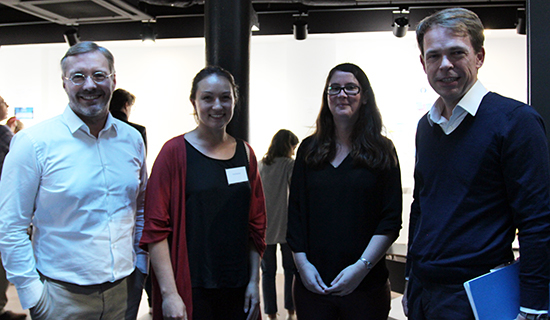Redesigning Corporate Law for the Digital Age
At the start of October, six HEC Paris students – including three interns – teamed up with legal experts, anthropologists, designers, business executives, software publishers, engineers and communications advisers, for an “Ideation Sprint” organized by French international technology consulting firm Atos. Their aim? To redefine our legal experience and its contractual practice at the heart of Atos, a global leader in digital transformation. Across two days at the Chocolaterie in central Paris, some fifty people took part in the inaugural event led by Alexandre Menais, Atos Executive Vice President, and the innovation agency InProcess.

“As far as we’re aware, this is a world first ,” said Alexandre Menais, after the workshop came to a close on October 4. “We have seen hackathons in the past, but this is a multidisciplinary and multicultural workshop aiming to put men and women back at the heart of our services. Split into four groups, the 50 participants enacted the global approach that we are looking to implement. With the help of InProcess, we hope that the design projects devised during this event will transform our relationships with our colleagues and our clients. ”
At the start of the event, the former HEC student (Executive MBA 2008-09) made an appeal to a group of anthropologists inspired by Pascal Picq, a French paleoanthropologist and a prolific author on the evolution of man. Alexandre Menais is a close follower of his work, along with that of Laurent Alexandre and Yuval Noah Harari. The three specialists describe ways of overcoming business obstacles through Darwinist thought. In Atos’ case, these obstacles reveal themselves in a dehumanized approach to digitalization.
“Digitalization is a complex – and often intimidating - process. What’s more, there is a general lack of confidence amongst employees. This means that processes reflecting an employee’s need to exist are becoming increasingly complicated. ” The aim of the two-day workshop was to encourage legal experts to “reconsider their work methods and rethink their future in this new environment, by prioritizing a “’more agnostic’ approach to innovation. ” “In this context, which also includes automation and AI, we need to adopt a cognitive form of intelligence that will allow us to express our emotions and our creativity. In order to target Atos’ needs more effectively, a team of anthropologists preceded the workshop to conduct a three-week study of this “tribe” of legal experts in its natural habitat and to interact with all interested parties. It was vital that their methods were outward-looking, you see!”
Putting Cognitive Thought into Practice
Some observers say that emotion and creativity do not intertwine often enough in the legal world, or in the world of artificial intelligence: “And they are spot on! ” said Menais. “Faced with the standardization that is fast approaching, the creative mind will be able to stand out. This may seem counter-intuitive, but creativity is what we are going to demand of our employees. As a result, we will be able to make Atos’ contractual policies more accessible to our clients and partners, for example. ”
Hence the design approach pushed by Atos and InProcess at this brainstorming event. InProcess shares Atos’ desire to use methods from the human sciences when it comes to innovation and growth acceleration. Led by their founder, Christophe Rebours, representatives from InProcess organized four groups focusing on the following key themes: time allocation, knowledge management, information transparency and communication channels. The process was simple: participants wrote short sentences on Post-Its to sum up their main expectations, before expanding on their ideas as a group. A designer then translated the sentences into a universal language that could be integrated into all of Atos’ projects.
“It is designers, rather than anthropologists, that are going to turn ideal scenarios into a reality ,” explains Christophe Rebours in Les Echos . Following in-depth testing, these scenarios will create real specifications and find daily expression at the heart of the legal department: “We are expanding the limits of what Atos can achieve, as we bring it from the world of constraint to the world of growth acceleration, ” concludes the CEO of InProcess.
HEC Embodies Openness and Youth
For Alexandre Menais, the input of HEC students is a “crucial” factor in the development of these projects. Having first made contact with Atos at the end of September, Jeanne Cousin, Elodie Tancray and Julie Serrier - a trio of students in the MS/LLM International Law and Management program directed by Michael Loy - then took part in every stage of Ideation Sprint . “We must put this collaboration into context ,” added Menais. “The ties between Atos and HEC Paris go back over a decade, when we co-founded the Strategy Chairs for development and integration management. And just last year, we teamed up with HEC’s Digital Center to run workshops on digital transformation.”
“During this event, we were looking for the spirit of progress and adventure that the school and its professors embody. What’s more, the students belong to a generation that is particularly sensitive to our approach and particularly well equipped to face the complexities of a digital world, which will favor people (like those at HEC) with a cognitive intelligence. Finally, HEC has always fueled the view that organizations need bold company managers if they are to make a difference, a factor that is often sadly lacking in the business world. ”
It is with such initiatives that Alexandre Menais hopes to lead a quiet revolution. He thinks that once this new outlook has made its mark on Atos’ legal teams, the entire organization will be ready to adopt it. Given that this leader in digital services has offices in 72 countries and over 100,000 employees, such upheaval would have a significant impact around the world.